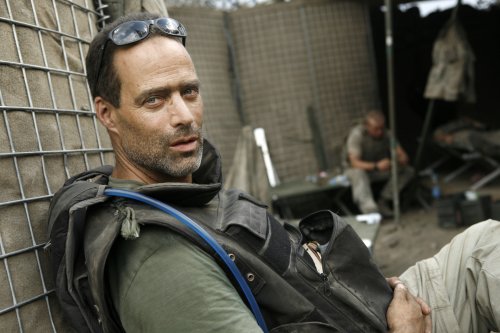War Journalist on Brotherhood and Longing for Combat
Sebastian Junger, Author of War, Speaks at the DoubleTree

As a journalist, Sebastian Junger said it’s his job to translate, to tell one group’s story to another in the name of understanding and hopefully a bit of appreciation. For his new book, War, he spent a year with front-line U.S. troops in Afghanistan, documenting lives filled with dirt, bullets, and brotherhood to interpret for the rest of us what it means to be a young man in combat, what pulls people back to war, and why coming home is such a sad struggle for many veterans.
Junger spoke to a packed Fess Parker’s DoubleTree Resort conference room during Thursday’s Channel City Club-sponsored luncheon. A veteran wartime reporter who grew up in a leftist, pacifist family, Junger said he embedded himself in the Korengal Valley, which, at the time, was the hairiest, deadliest site of fighting in Afghanistan. He was stationed with a platoon at Restrepo, a small but fortified outpost that troops pickaxed out of a mountainside as they took fire. (Restrepo is also the name of the award-winning 2010 documentary Junger directed. The Independent interviewed him here about it.)
Noting that American press these days – thanks to the Bush administration – has nearly unfettered access to the battlefields of international warfare, Junger said he traded a rifle for a camera and notepad. He took orders, sleeping, eating, and going on patrol when told. He did all this, he said, to try and understand what it’s like to be a modern soldier on the front lines.
It’s an experience, he explained, that differs little from generation from generation as combat troops – compared to support personnel, engineers, and so on – endure experiences that transform them in often devastating but sometimes positive ways. Although proud of their responsibility as the tip of the spear, combat platoons invariably suffer the heaviest hits. Currently, 3 percent of the Army absorbs 80 percent of its casualties. Junger also stressed the completely “random math” that determines who is killed and who survives. “You can do things that help your chances – take cover, believe in God – but at the end of the day, your fate is completely arbitrary. That’s a terrifying idea for someone [like me] in their forties, but for someone 19 years old to wrestle with that existential truth is ghastly.”
Calling the unpredictable, adrenaline-packed atmosphere of combat “captivating” for younger men – a draw that hearkens back to our days as hunter-gatherers – Junger said to be selected for combat infantry is like “getting picked for the football team.” But the most rewarding and lasting impression left on the troops, he explained, is the sense of brotherhood that develops among the men. More than friendship, the bond is “an extreme form of altruism.” The one central value in combat is to be self-sacrificing for the betterment of the group as a whole. That’s why, said Junger, you hear about a soldier jumping on a grenade to save his comrades. “It’s an incredible sense of love,” he said.
What most people fail to realize, Junger went on, is that when a soldier reenters civilian life, that comfort of brotherhood is all but lost. To not have that sense of purpose and belonging can be be devastating, and is part of the reason veterans yearn to return to the battlefields. A man in combat is only judged by his willingness to die for his brothers, but once he’s plopped back in the real world, he’s subject to scrutiny from all angles. That is a hard reality to cope with, said Junger, especially for someone 19 or 20 years old – often with few job or relationship prospects – at the bottom of the social hierarchy.
Junger then talked about his late friend and colleague, Tim Hetherington, killed in Libya last month. Hetherington was an acclaimed war photojournalist who accompanied Junger to the Korengal Valley to make Restrepo. Not long after hearing the news and beginning to cope with the loss, Junger said he received a letter from a Vietnam veteran. In the letter, the veteran said Junger came close – very close – to discovering the truth about war during his time at Restrepo, but didn’t quite get there. He finally did, the veteran explained, only when Hetherington died. It’s the one “absolute truth” of war, as he put it, “that you will lose your brothers.” Junger said it was a profound insight.
Taking questions from the audience, Junger said one of the main issues with the Afghanistan War is that Afghans, at the moment, don’t have a good reason to fight. President Hamid Karzai’s inept government, said Junger, gives men no motivation to sacrifice themselves for it. During warfare in the 1990s, Afghans were fighting for a sovereign country, Junger said. Now they’re fighting for corruption. “[The U.S.] can’t leave until they have someone in power that they can fight and die for,” he said.
When asked by a member of the Santa Barbara Navy League – which will host a group of recent veterans in the near future – how best to talk and interact with the group, Junger said to avoid asking what their experience overseas was like. They often recoil from talking about it, he explained, and feel the only people who can truly understand what it was like were there. The best thing one can do, said Junger, is to tell them how proud we are of them. If the situation calls for it, a hug couldn’t hurt either, he said.



